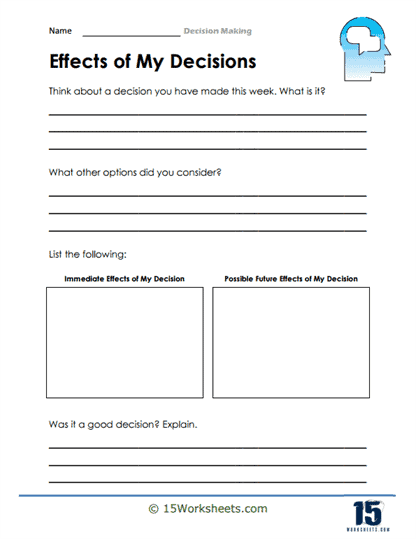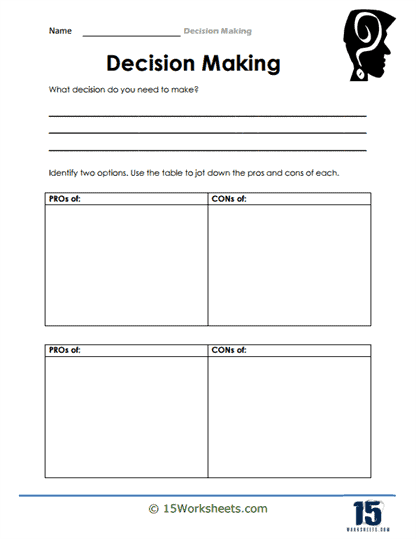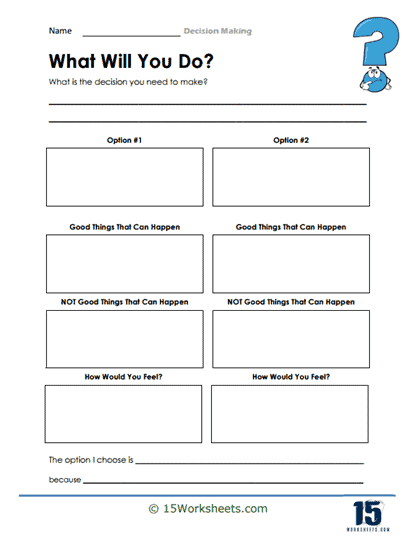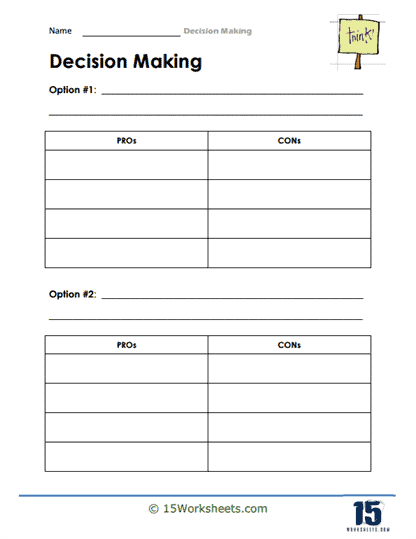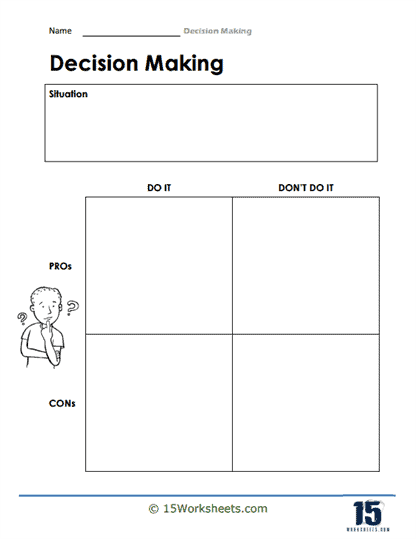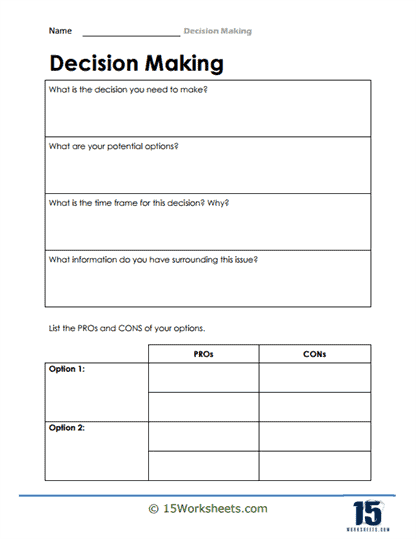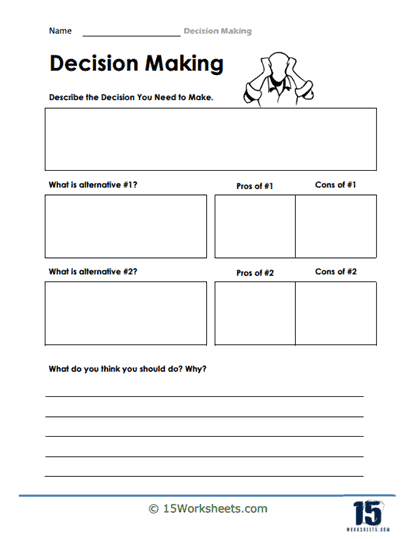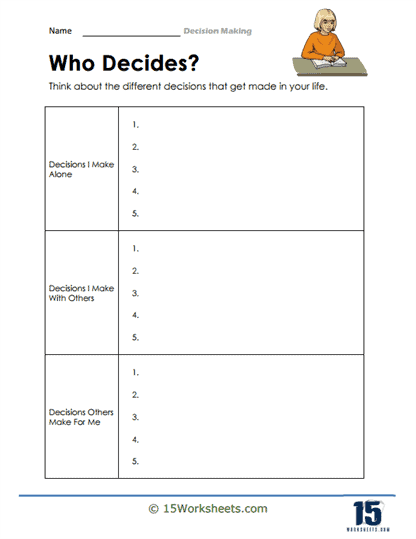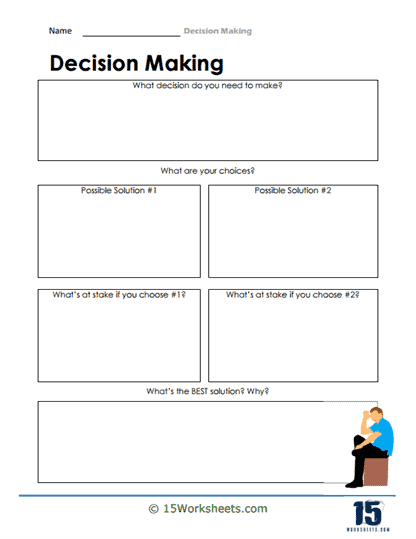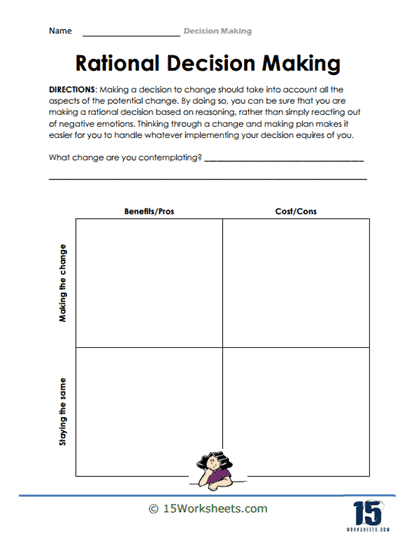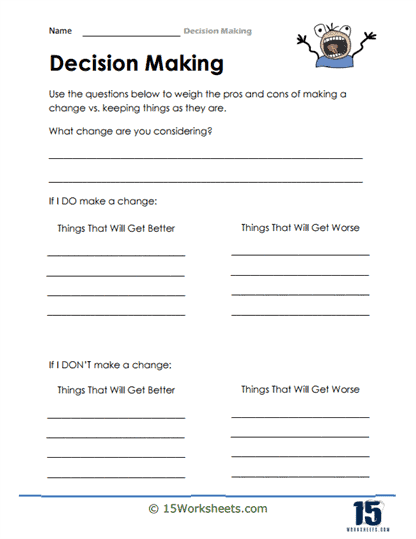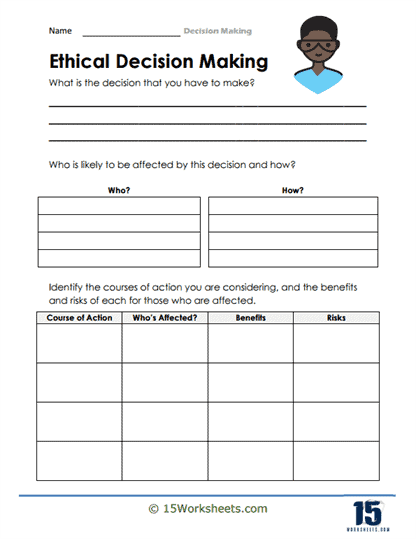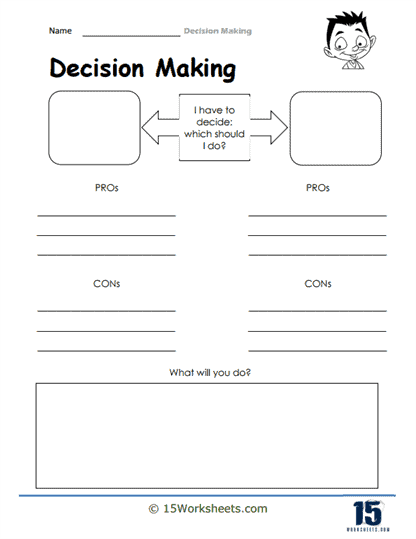Decision Making Worksheets
All About These 15 Worksheets
Effective decision-making is more than just a skill-it’s a cornerstone of personal growth, academic success, and future leadership. For students, the ability to navigate decisions with clarity and foresight can profoundly shape their academic journey, social interactions, and future career paths. Yet, decision-making can often seem daunting, especially when faced with the pressure of multiple options, uncertainties, or ethical considerations. To address this critical need, we’ve designed a comprehensive series of 15 worksheets that delve into the intricacies of decision-making, guiding students step by step through the process.
These worksheets are not just a collection of exercises-they represent a roadmap to mastering the art of making informed, thoughtful choices. Each worksheet is carefully crafted to tackle various aspects of decision-making, from understanding the basic steps of identifying options to grappling with more complex considerations like weighing consequences and reflecting on long-term impacts. By immersing themselves in these activities, students will develop essential life skills that go far beyond the classroom.
At the heart of these worksheets is the concept of choice. Students often encounter situations where the number of available options can feel overwhelming. The first few worksheets in this series focus on honing students’ ability to clearly identify all possible options before making a decision. This is crucial because many poor decisions stem from a failure to recognize the full spectrum of possibilities. Encouraging students to think creatively and expansively before narrowing their focus helps prevent tunnel vision, where only the most obvious or convenient solutions are considered.
Once students are comfortable with identifying options, the worksheets guide them through the next critical step: evaluating the pros and cons of each possibility. Decision-making, at its core, requires a balance between analysis and intuition, and this section of the worksheets emphasizes structured analysis. Students are prompted to break down the potential advantages and disadvantages of each option, considering factors such as feasibility, resources, and the alignment with their personal goals or values. By systematically weighing these factors, students learn to prioritize options that offer the most benefit while minimizing risks or drawbacks.
The worksheets also place a strong emphasis on reflection-an often-overlooked aspect of decision-making. It’s one thing to make a decision, but another to pause and consider the outcomes of that decision. This reflection process teaches students to assess their choices with a critical eye, examining not only the short-term effects but also the broader, long-term consequences. Such an approach fosters a growth mindset, where students recognize that even decisions with less-than-ideal outcomes provide invaluable learning opportunities. Through reflective exercises, they can identify areas for improvement, fine-tune their approach, and develop resilience in the face of future challenges.
A Look At Individual Worksheets
If you’ve ever seen a middle schooler try to choose between tacos and pizza for lunch, you know that decision-making is no small feat. Luckily, the Decision Making Worksheets on 15worksheets.com are here to turn even the most indecisive tween into a confident, life-choosing machine. We start this journey into the mind with “Rate Yourself,” a worksheet that holds a metaphorical mirror up to students and asks them to honestly rate their decision-making prowess. Spoiler: if a kid gives themselves a 10/10, they probably just decided to skip their homework in favor of Minecraft. But it’s a start-self-awareness is the first step on the long, snack-filled road to wisdom.
Next up, we step into the world of consequences with worksheets like “Immediate And Possible Effects,” “What’s At Stake?“, and “If You Make A Change.” These gems ask students to do the mental time-travel thing: “If I pull this prank today, will it still be funny when I’m grounded for a week?” These exercises help students weigh short-term fun against long-term consequences, an invaluable skill when faced with decisions like whether to study for the math test or binge-watch cat fail compilations. Suddenly, cause and effect isn’t just for science class-it’s a way of life.
Then we move into the meat and potatoes of option exploration, where the worksheets get deliciously complicated. “Considering Options,” “Thinking of Alternatives,” “Questions and Listing,” and “Picking The Best Option” turn students into philosophical ninjas. Should I join the soccer team or the drama club? Should I tell the truth or pretend the dog ate my essay? These worksheets guide kids through brainstorming, listing, and evaluating like little CEOs of their own lives. Add in “Pros And Cons Table” and now we’ve got spreadsheet-level critical thinking. Students weigh their choices like tiny, emotionally developing accountants.
And then, of course, the big question: will they actually do the thing? Enter “Doing It Or Not” and “What Will You Do?” These worksheets take all the careful thinking and say, “Okay, now make the move.” It’s like a game show of personal growth. Will you phone a friend? Ask the audience? Freeze in panic and run away screaming? These worksheets encourage action-and, occasionally, the courage to say no to peer pressure and yes to flossing.
The series hits you with the deep stuff-“Rational Decision Making,” “Ethical Decisions,” “The Thinking Process,” and “Who Decides?” Here, students are asked not just what they choose, but why. Is it rational? Is it fair? Is it just because everyone else is doing it? These worksheets move decision-making into the realm of ethics, logic, and identity. And somewhere between “Who Decides?” and “Ethical Decisions,” a student realizes: Oh no, I am the adult now. But don’t worry-it’s not all serious. There’s still time to make a pro/con list about whether or not to eat that questionable cafeteria burrito.
How to Improve Your Decision Making
In life, there are many decisions to be made. You will come across countless opportunities and have the freedom and responsibility to make the correct decision. Decision-making is also a considerable part of any workplace. You should be able to make efficient and quick decisions that will help you save time and make the best use of your resources.
When making decisions, you need to sort through some choices in your head and look at information from all angles. This will allow you to make a well-informed decision you will not regret later in life.
Here are some ways you can improve your decision-making skills:
1. Come Up with a Plan
If you know that you will have a decision to make soon, you must come up with a plan beforehand. For example, if you have to decide how to get your team to meet your company’s goals, make notes about the size of your team and come up with individual goals before you address the primary matter.
Before making a decision, you should examine all the resources and materials around you. Most people feel overwhelmed when making a decision, but planning ahead can reduce the stress you might feel at the moment. You must clarify your priorities and how you want to accomplish them. Clear goals are essential to making the correct decision. You should be able to think long-term instead of making decisions that will benefit you at the moment but bring up a stream of problems for you in the future.
2. Be Assertive
Decision-making does not have to be scary. You need to feel in command before you take any big step. Even though you might not feel confident, you mustn’t doubt yourself. Self-doubt only makes it difficult to make decisions.
However, this does not mean rushing into anything. You need to use your three brains. This means listening to the part of your brain that solves problems and is creative, as well as the heart side of the brain that is compassionate and passionate. Lastly, you need to listen to the gut side of your brain that will give you the courage to make decisions.
3. Understand How You Will Benefit
Failure to make good decisions can point to how we manage our interests and how attached we are to people. Before you make a decision, determine how your decision might benefit you. Recognize that you are emotionally attached to the people in the situation.
You should also check in with yourself to see if there is any past memory triggering you or holding you back from making a decision. If need be, ask a trusted partner for help and advice, and then make up your mind.
4. Keep Your Biases in Check
Decision-making is a leadership quality everyone can have, as long as they work towards it. However, sometimes you might find that time pressure is too high, and you do not have enough information available.
Some leaders rely on their gut to make decisions. While being in tune with your intuition is definitely helpful, you must also self-reflect and realize that personal biases may drive your decisions. When making a decision, it is vital to be impartial and factful. Do not favor your friends and overlook those you do not get along with. Instead, making a just decision that would be mutually beneficial to everyone.


